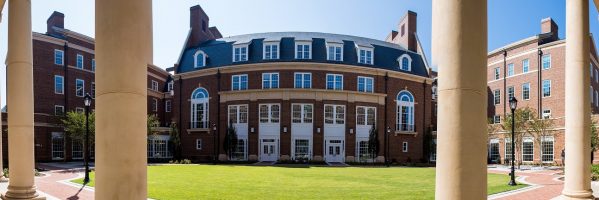Friday News – Vanderbilt Receives STEM Designation, Michigan Ross Honored by AACSB, and More

Let’s take a look at some of the biggest stories from this week, including the new Vanderbilt STEM designation at the university’s Owen Graduate School of Management.
Vanderbilt MBA Finance Concentration Receives STEM Certification – News & Events
The Owen Graduate School of Management at Vanderbilt University has announced that, starting this fall, its finance concentration will be a STEM degree program. This gives international students the opportunity to extend post-completion Optional Practical Training (OPT) in the US by 24 months.
Sue Oldham, Associate Dean, MBA Programs Operations, says, “We were able to work with our faculty to ensure that this STEM designation in the Finance concentration is one that would have an immediate impact, not only for our current students but for all prospective students… [It] is a direct result of the leadership team here listening to what our students are saying, specifically our international students.”
The OPT program enables international students to remain in the United States for 12 months in order to receive work training. With the new STEM designation, this period has been extended an additional 24 months for international finance students to build their careers. For more on the new Vanderbilt STEM designation, click here.
Michigan Ross Dialogue About The Future of Business Named for “Innovation that Inspires” – Michigan Ross News Blog
A discussion that took place last year at the University of Michigan Ross School of Business has been selected by the Association to Advance Collegiate Schools of Business (AACSB) for its contribution to academic thought and practice across the b-school community and the world at large.
“Working Toward Shared Prosperity: An Academic-Executive Dialogue,” included academics, along with business, labor, government, and nonprofit leaders who seek to improve conditions of employment and economic growth via practical solutions. Participants and attendees of the discussion came away with renewed energy toward enabling their academic work to address real world issues.

“Working Toward Shared Prosperity: An Academic-Executive Dialogue” earned the coveted 2019 Innovations That Inspire designation by the Association to Advance Collegiate Schools of Business (AACSB) / Photo via michiganross.umich.edu
The talk was a partnership between Michigan Ross and The Aspen Institute. Read more about the discussion, the AACSB, and the Aspen Institute here.
Economic and Environmentally Sustainable Solutions at the Forefront for the University of Toronto’s NeXus Consulting Group – Rotman News
The University of Toronto’s Rotman School of Management announced five of its MBA students joining its consulting group, NeXus Enterprises, which focuses primarily upon sustainability and social impact in its practice.
Founded in 2005, NeXus has worked with clients in 10 different countries to assist them in business planning, market research, financial modeling, scaling and expansion efforts. John Visser, a NeXus board member, says, “Social impact organizations are being challenged to deliver more value than ever before. Recent NeXus teams have executed a range of projects that have enabled boards and management teams to take their organizations to the next level.”
The new members of NeXus, all 2020 graduates of the Rotman MBA program, bring their expertise in technology, healthcare, marketing, design, engineering and construction to the group. Read here for more on NeXus and the Rotman team.
Marrying Science and Business Education For A More Sustainable Tomorrow – Fox School News
An industrial ecology project team at Temple University’s Fox School of Business, featuring an MBA student, a legal studies professor, and an engineering professor, have set an admirable example of how to meld disciplines.
Legal studies professor Daniel Isaacs Civil and Environmental Engineering Assistant Professor Avner Ronen, and MBA Vidya Sabella collaborated to solve a pressing problem: reducing wastes created by businesses.

(Left to right) Daniel Isaacs, Avner Ronen, and Vidya Sabbella / Photo via Joseph V. Labolito
Professor Isaacs (who is also head of the Global MBA program) says, “Business, technology, science and education should not be siloed. With broader educational opportunities like this one, environmental issues can be the drivers of innovation…Students and leaders alike need to start thinking about business in terms of what their obligations to future generations should be.”
You can read more about the team and project here.
MIT Food Systems Lab Announces Seven New Seed Grants – MIT News
The Abdul Latif Jameel Water and Food Systems Lab (J-WAFS) announced a new round of funding for an array of projects that will further innovation in farming and sustainable supply chain management in multiple countries. MIT Sloan is among the branches of the school to receive grant money.
Among the other innovations and developments will be increased food safety for everyday consumers; productivity technologies for small farmers, and water filtration methods for eliminating pollutants to food supplies. Thirty-four research teams applied for funding, and the directors of J-WAFS were tasked with choosing the best of the best.
Renee Robins, Executive Director of J-WAFS, says, “The broad range of disciplines that this applicant pool represents demonstrates how meeting today’s water and food challenges is motivating many diverse researchers in our community.”
Find more details on the seed grants and their recipients here.
Rochester Simon STEM-Designated MBA Paves New Path

As international applications at U.S. business schools drop, there’s more demand than ever for science, technology, engineering, and math disciplines in MBA curriculum.
Why? The new STEM designation program.
Created by the federal government to help with the shortage of qualified workers in the STEM fields, the program makes H1b visas far more attractive. If a student attends a STEM-designated education program and gains a STEM job after graduation, they gain an additional 24 months of optional practical training (OPT) time. This lengthens their stay in the U.S. from one to three years, which is very attractive to candidates and a solid reason for schools to consider the STEM designation. And many have.
Top B-Schools Get STEM-Designated
Last year, Duke University’s Fuqua School of Business added a full-time MBA certificate in management science and technology management that was STEM designated. Two years ago, the University of Wisconsin School of Business achieved STEM designation for two MBA specializations: supply chain management and operations and technology management. The University of Massachusetts at Dartmouth also has a STEM designation for its Charlton MBA with a specialization in business analytics.
However, only one b-school has earned a STEM designation for its full-time MBA program no matter the specialization: the University of Rochester Simon Business School.
“We’re the most quantitative business school in the top 50, and that’s necessary to get this STEM certification,” says Dean Andrew Ainslie. “We’re in a unique position. We have an unusually high amount of math and technical curriculum. So, when we started looking at the percentage of our classes dedicated to STEM, it was obvious that we easily met the guidelines. A STEM-designated MBA just made sense for our students, and I don’t think anyone can follow us.”
How Simon Business School Achieved its STEM Designation
Moving to a STEM designation was reasonably easy for Simon Business School; it’s been built into the school’s DNA since the 1970s. Back then, the dean decided that the majority of the coursework should be focused on quantitative subjects—economics, statistics, and operations—and that’s held through until today.
“STEM designation is interesting; it’s all done internally. There are federal guidelines for what’s required, and we can be subject to audits, but we’re the ones responsible for overseeing our STEM-designated MBA program on campus,” says Ainslie.
This meant it was up to Rochester to take a look at their MBA curriculum and decide if they had the right percentage of math- and technology-based curriculum to fit the absolute minimum acceptable level. That level was, “at least 50 percent of the classes should have at least 50 percent STEM content. So 25 percent of all classes being STEM,” Ainslie explains. “We’re well above that.”
50 to 60 Percent STEM Curriculum
“We don’t have any faculty in soft areas such as HR or behavioral studies,” Ainslie explains. “That’s necessary to do this. All of our faculty voted positively on STEM designating in every area.” And while the school has started to add some curriculum in other areas—communications and experiential learning—around 50 to 60 percent of all their MBA content is STEM, far more than necessary to get the certification.
Even with variability in the second year when students can choose their electives, it was easy for Simon’s MBA program to achieve the STEM designation. “We are something of an unusual program in how analytics focused we are. Our branding is around analytics, and that shows,” says Ainslie.
And in cases where more STEM content was required, many of the faculty were happy to revise their curriculum to fit the designation better. One professor even decided to create an entirely new finance course that “uses R and Python programming to teach about finance through algorithms and coding,” Ainslie explains. “It’s a new course on technology and finance, and he wasn’t the only professor to do something like this.”
Simon Business School Meeting Recruiter and Student Needs Post STEM-Designated MBA
As for what’s happened at the school since achieving a STEM-designated MBA program, while it’s always tricky to tell what’s driving things, Ainslie believes things are going well. This year, MBA applications were up 7 percent, and while that might seem modest, it’s an increase that Simon Business School is quite happy about.
They’ve also recognized some changes in regards to recruiting and hiring. While they’re not changing who they go after or how, they are definitely making sure that all of their MBA candidates understand the advantage of STEM. “It’s not just the three years of a work visa, but business has become much more analytics-focused,” says Ainslie. “STEM skills are valuable in the marketplace. A STEM MBA is what companies are looking for.”
And that’s definitely true when it comes to Simon’s recruiters. Since their STEM designation, they’ve had many alumni and recruiters reach out to them about their STEM MBA and express their excitement.
“Technical skills are in high demand,” explains Ainslie. “But there are only 65,000 H1b visas every year and 2.3 million STEM jobs. The market is desperate to get those positions filled.” And Simon is in the perfect position to help.
You can learn more about Simon Business School’s new STEM MBA here.
This article has been edited and republished with permissions from its original source, Clear Admit.
Rutgers Supply Chain Analytics Student Spends Summer at Amazon, and More – New York News

Let’s explore some of the most interesting stories that have emerged from New York business schools this week.
Beginning a Career in Supply Chain at Amazon – Rutgers Business School
Rutgers Business School exchange student Qiying Xu recently had an opportunity to put her supply chain management theory and Lean Six Sigma course work to use as part of an entry-level management position she will pursue at one of Amazon’s new fulfillment centers.
Xu writes that the Rutgers specialty master’s program in supply chain analytics gave her “the picture of the whole supply chain. The data analytics skills she’s accrued have almost single-handedly “changed the course of [her] career.”
You can read the full article on Xu’s work here.
Bridging the Gap Between Politics and Renewables – Johnson Business Feed
In a new op-ed with his alma mater, recent Johnson SOM graduate Mark DesMeules, MBA ’18, wrote about the role his school played in his career pivot from politics.
“I came to Johnson to accomplish what is colloquially known in the MBA world as a ‘career pivot.’ Prior to joining the Johnson community, I worked in politics in the nation’s capital—Washington DC. After gaining nearly five years of advocacy experience through my work with start-ups, non-profits, and Fortune 500s on intellectual property and technology policy issues, I decided to shift my career trajectory toward an industry I had always been passionate about: renewable energy.”
DesMeules writes that he was immediately sold on Johnson because of the school’s “robust academic and extracurricular offerings on sustainability and renewable energy.”
He elaborates, “At Johnson, I had the chance to explore the intersection of energy, sustainability, and business, all while becoming comfortable with ambiguity and complex business problems.”
“My Johnson colleagues, peers, and professors helped me learn, grow, and successfully pivot from the world of policy to the renewable energy industry. I am excited for the future and look forward to continuing to grow in the next chapter of my career.”
You can read the full op-ed from DesMeules here.
Governor Phil Murphy Selects Stevens to Announce New STEM Initiatives – Stevens Institute of Technology Blog
New Jersey Governor Phil Murphy recently visited Stevens Institute of Technology School of Business’ ABS Engineering Center to announce “two new STEM initiatives to retain highly-trained, technology-savvy college graduates in the state.”
The first is a “loan forgiveness program,” which will see “anyone who has worked in a STEM-related job in New Jersey for at least four years receive $2,000 per year, in years 5,6,7,8 at the same job, for a total benefit of $8,000. Employers and the state would split the covered amount 50/50.”

NJ Gov. Phil Murphy speaking at the Stevens Institute of Technology School of Business / Photo via stevens.edu
The second is an internship program for high school and college students in STEM fields, which reimburses “participating employers 50 percent of intern wages, up to $1,500 per student.”
Murphy said, “Stevens is one of the premier places where tomorrow’s leaders in innovation are learning the skills they will need to be successful and to change our world. If we are to grow the innovation economy again, we cannot lose our college graduates after graduation. I want them to stay here, in New Jersey, to be part of our economic future.”
Check out the full article here.
Why Bloomberg Businessweek Is Praising the UGA Terry College of Business

At the top of last month’s annual Bloomberg Businesweek domestic MBA rankings, the normative favorites reigned supreme, with the likes of the Harvard Business School, the Wharton School at the University of Pennsylvania, and the MIT Sloan School of Management sitting at the top of the ranking. A quick glance at the top 20 features more of the same, with Ivy League institutions coming in strong, as well as other large school powerhouses like the UCLA Anderson School of Management.
But the real meat and potatoes of the list, beyond stacking trophy cases for the already trophy-rich schools at the top, are the schools that shoot up the rankings the most, sometimes jumping eight or more spots from the previous year. Among the most lauded institutions that made its way up the rankings is the University of Georgia Terry College of Business, climbing from 65th overall in 2016 to 55th overall this year.
Santanu Chatterjee—the full-time MBA Director and Associate Professor of Economics at the Terry College of Business—recently spoke with MetroMBA, saying that part of the reason the school has earned such high praise is because of the concentrated effort of life after graduation.
The school has “a purposeful and deliberate strategy that connects admissions, student experience, and career management, by focusing on employability at the front end, a high level of customized career services for both students and employers, and a market-driven curriculum that ensures professional success for our students,” according to Chatterjee, who originally joined the Terry College of Business in 2001, just after earning his Ph.D. in economics from the University of Washington.

Santanu Chatterjee, Terry College of Business Director, Full-Time MBA Program and Associate Professor.
Although the Terry College of Business is part of the University of Georgia, one of the largest state schools in the U.S., its reputation still lags a bit behind some of the other big name brand institutions. As evident in its climb in the Bloomberg Businessweek ranking, however, its reputation as one of the better, under-the-radar business schools may be soon changing as the result of a plan that has been years in the making.
“Over the past three years, we have focused on making our curriculum more sensitive to the needs of the marketplace,” he says. “Initiatives have included new concentrations in Healthcare Management and Human Resource Management, areas of emphasis in Consulting and Financial Technology (FinTech), and an expanded focus on experiential/project-based learning. Most of our students complete one project with a corporate partner before their summer internships. We have also revamped our Leadership Fellows Program, and set up two new advisory boards, in Atlanta and in the Silicon Valley.”
Part of the wave of program changes over the past few years also comes from newfound partnerships with many of the University of Georgia’s other esteemed colleges, establishing newfound dual degree programs to help facilitate an academic edge many of the country’s smaller schools simply cannot provide.
“While we continue to work on making the MBA curriculum more market-driven, we are also focused on a more interdisciplinary approach to business education,” he says. “Over the past three years, we have worked to develop new dual degree programs with the College of Engineering, Law School, Medical School, and the College of Public Health. New dual programs are currently being developed that include the College of Pharmacy and a one-year STEM MBA for UGA undergraduates in the STEM disciplines. A new one-year Master of Science program in Business Analytics is also awaiting final approval from the University System. These new programs will enable us to significantly expand our corporate relationships and partners, which in turn will help support our curriculum and student support initiatives.”
The use of broader university resources speaks to what Chatterjee believes is becoming a definitive advantage to not only Terry College of Business students, but University of Georgia students as a whole.
“Across the board, the Terry College of Business is focused on student success by providing them with an outstanding academic and experiential learning experience,” he notes. “This philosophy cuts across programs at all levels, from undergraduate to the Masters and Ph.D. [programs]. We have a roster of world-class faculty, excellent facilities, and a dedicated network of more than 70,000 alumni who work tirelessly to improve the quality of education and career success for our students.”
Even with the noted praise Chatterjee eschews for the business school, one program strength he may be overlooking is the welcomed affordability of the Terry full-time MBA, which only costs Georgia-based residents $15,670 per year, compared to several of the more popular MBA programs in the U.S., which often venture into triple digit territory by the end of the program.
For more information on the Terry College of Business and its increasingly praised MBA program, head over to the official Terry College of Business website.
Washington Business Ranked Best in U.S. for 2017

For 11 years, CNBC has ranked the nation’s states to determine which are the most economically competitive. After months of data analysis—reviewing more than 60 measures of competitiveness from taxes to regulatory climate and quality of the workforce—Washington came out as “America’s Top State for Business in 2017.” Continue reading…
Rady Partners with Athena San Diego to Mentor Female Entrepreneurs

At UCSD’s Rady School of Management, developing women in business has always been a priority. In fact, just this year, the full-time MBA class welcomed 39 percent female students. And now, they’re taking their work one-step further. In partnership with Athena San Diego—which has worked for 20 years to connect and support women in STEM (science, technology, engineering and math)—Rady is offering mentorship to female founders and leaders as part of its mystartupXX accelerator. Continue reading…

